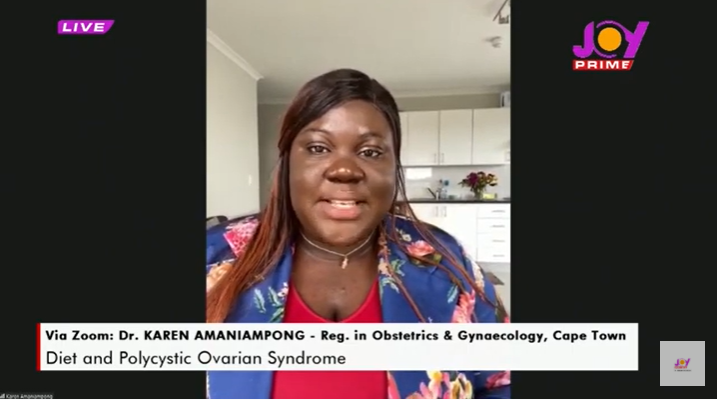
Audio By Carbonatix
A Gynaecologist with the Obstetric and Gynaecology Department in Cape Town, South Africa, Dr. Karen Amaniampong says Polycystic Ovarian Syndrome (PCOS) puts most women into a state of depression.
Dr. Amaniampong explained that excess androgen in women with PCOS has a physiological effect on the female anatomy. She said other symptoms such as; irregular menstruation, issues of getting pregnant, obese amongst others, put women into a mood of psychological worry, which leads to depression.
“PCOS put women at risk of developing psychological problems and depression due to its persistent effects and the worry associated with women having irregular or scanty menstruation”, she stated.
PCOS is a hormonal disorder causing enlarged ovaries with small cysts on the outer edges, common among women of reproductive age.
Speaking on Joy Prime's Good Living on Tuesday, She noted that it affects one’s mood for a long time if not detected at the early stage, this as well as changes in the female reproductive system caused by excess androgen puts these women into a state of frequent worry which is a risk factor of depression.
She stated that all women within the reproductive stage can be affected, hence the need for women to seek medical check-up when they experience the symptom mentioned earlier because it ranges from mild to severe making it difficult to identify at the mild stage.
Women with PCOS may have irregular menstrual periods or excess male hormone (androgen) levels. The ovaries may develop numerous small collections of fluid (follicles) and fail to regularly release eggs.
The cause of PCOS may involve a combination of genetic and environmental factors with symptoms including, menstrual irregularity, excess hair growth, acne, and obesity.
PCOS is a hormonal disorder causing enlarged ovaries with small cysts on the outer edges, common among women of reproductive age.
Latest Stories
-
Ghana is rising again – Mahama declares
4 minutes -
Firefighters subdue blaze at Accra’s Tudu, officials warn of busy fire season ahead
35 minutes -
New Year’s Luv FM Family Party in the park ends in grand style at Rattray park
39 minutes -
Mahama targets digital schools, universal healthcare, and food self-sufficiency in 2026
47 minutes -
Ghana’s global image boosted by our world-acclaimed reset agenda – Mahama
1 hour -
Full text: Mahama’s New Year message to the nation
1 hour -
The foundation is laid; now we accelerate and expand in 2026 – Mahama
1 hour -
There is no NPP, CPP nor NDC Ghana, only one Ghana – Mahama
1 hour -
Eduwatch praises education financing gains but warns delays, teacher gaps could derail reforms
2 hours -
Kusaal Wikimedians take local language online in 14-day digital campaign
2 hours -
Stop interfering in each other’s roles – Bole-Bamboi MP appeals to traditional rulers for peace
3 hours -
Playback: President Mahama addressed the nation in New Year message
3 hours -
Industrial and Commercial Workers’ Union call for strong work ethics, economic participation in 2026 new year message
5 hours -
Crossover Joy: Churches in Ghana welcome 2026 with fire and faith
5 hours -
Traffic chaos on Accra–Kumasi Highway leaves hundreds stranded as diversions gridlock
5 hours

